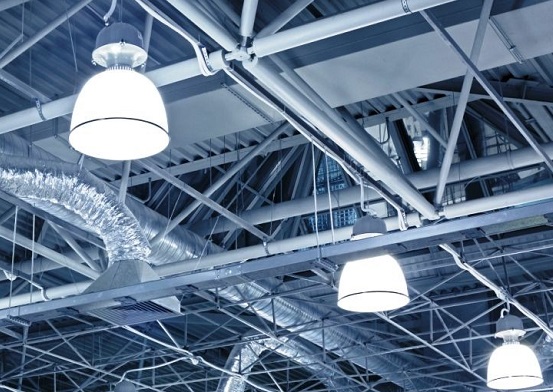M&E
Contents |
[edit] What does M&E mean in the construction industry?
In the construction industry, the term 'M&E' means 'mechanical and electrical'. It may be used to refer to mechanical and electrical systems, or mechanical and electrical engineers, mechanical and electrical drawings and so on.
[edit] What are mechanical and electrical systems?
Mechanical systems can include elements of infrastructure, plant and machinery, tool and components, heating and ventilation and so on.
For more information see: Mechanical engineer.
Electrical systems might include, power supply and distribution, telecommunications, computing instrumentation, control systems and so on.
For more information see: Electrical engineer.
Clearly there is a great deal of overlap, with many systems including both mechanical and electrical components, hence the term M&E.
[edit] What qualifications do M&E engineers have?
There are both mechanical and electrical engineering professionals who specialise in M&E. M&E engineers will often hold a degree in mechanical, electrical or M&E engineering. There are also combined mechanical and electrical engineering courses are available, with joint accreditation between the Engineering Council, Institution of Engineering and Technology (IET) and Institution of Mechanical Engineers. Chartered Engineer status can be awarded through the Chartered Institution of Building Services Engineers.
There are a large number of specialist M&E subcontractors and suppliers, and many of the bigger main contractors will have their own M&E divisions. A great deal of integration and co-ordination is required and designs are often a collaboration between consultants, contractors and specialists. This can cause problems where there are a number of separate disciplines, packages and suppliers, with no one party taking overall responsibility for co-ordination.
[edit] What is the difference between M&E and building services?
The terms 'M&E' and 'M&E engineer' are often taken as interchangeable with the terms 'building services'/ 'building services engineer'.
Building services are the systems installed in buildings to make them comfortable, functional, efficient and safe and might include:
- Building control systems.
- Energy distribution.
- Energy supply (gas, electricity and renewable sources such as solar, wind, geothermal and biomass).
- Escalators and lifts.
- Facade engineering (such as building shading requirements).
- Fire safety, detection and protection.
- Heating, ventilation and air conditioning (HVAC).
- Information and communications technology (ICT) networks.
- Lighting (natural and artificial).
- Lightning protection.
- Refrigeration.
- Security and alarm systems.
- Water, drainage and plumbing (including sustainable urban drainage systems (SUDS)).
- Carbon emissions calculations and reduction.
However, mechanical and electrical engineering can be a wider field than this, including areas beyond building design and construction, such as; large-scale power generation and transmission, transportation systems, infrastructure controls, industrial installations and so on.
For more information see: Building services engineer.
[edit] Related articles on Designing Buildings
- Air conditioning.
- Air handling unit.
- BSRIA.
- Building engineering physics.
- Building services.
- Building services engineer.
- CIBSE.
- Electrical engineer.
- Engineer.
- Institution of Mechanical Engineers.
- Mechanical engineer.
[edit] External references
Featured articles and news
Cutting carbon, cost and risk in estate management
Lessons from Cardiff Met’s “Halve the Half” initiative.
Inspiring the next generation to fulfil an electrified future
Technical Manager at ECA on the importance of engagement between industry and education.
Repairing historic stone and slate roofs
The need for a code of practice and technical advice note.
Environmental compliance; a checklist for 2026
Legislative changes, policy shifts, phased rollouts, and compliance updates to be aware of.
UKCW London to tackle sector’s most pressing issues
AI and skills development, ecology and the environment, policy and planning and more.
Managing building safety risks
Across an existing residential portfolio; a client's perspective.
ECA support for Gate Safe’s Safe School Gates Campaign.
Core construction skills explained
Preparing for a career in construction.
Retrofitting for resilience with the Leicester Resilience Hub
Community-serving facilities, enhanced as support and essential services for climate-related disruptions.
Some of the articles relating to water, here to browse. Any missing?
Recognisable Gothic characters, designed to dramatically spout water away from buildings.
A case study and a warning to would-be developers
Creating four dwellings... after half a century of doing this job, why, oh why, is it so difficult?
Reform of the fire engineering profession
Fire Engineers Advisory Panel: Authoritative Statement, reactions and next steps.
Restoration and renewal of the Palace of Westminster
A complex project of cultural significance from full decant to EMI, opportunities and a potential a way forward.
Apprenticeships and the responsibility we share
Perspectives from the CIOB President as National Apprentice Week comes to a close.
The first line of defence against rain, wind and snow.
Building Safety recap January, 2026
What we missed at the end of last year, and at the start of this.
























Comments
[edit] To make a comment about this article, click 'Add a comment' above. Separate your comments from any existing comments by inserting a horizontal line.
Really helpful explanation thanks.